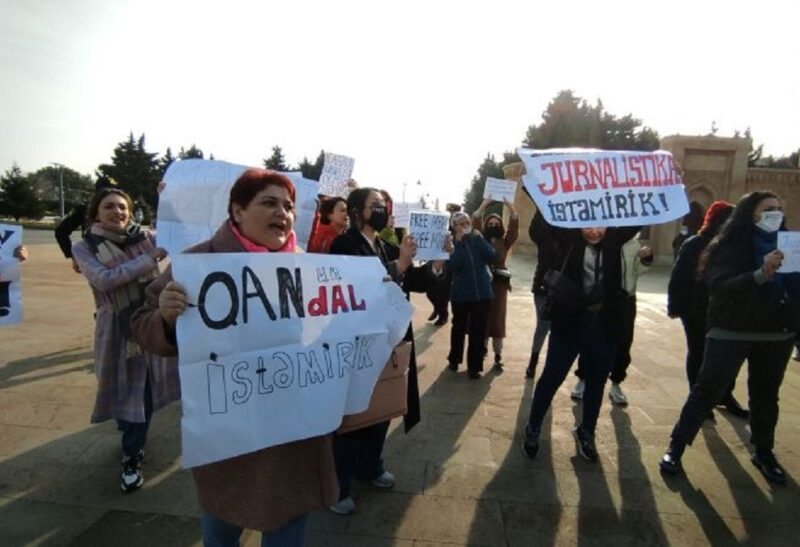On March 7, The Washington Times published an
op-ed
praising the recent appointment of Azerbaijan’s First Lady to the position of First Vice President and urging Washington to “applaud and wholeheartedly support Mrs. Aliyeva”.
The author of the article, Sohrab Sobhani, is the CEO of
Caspian Group Holdings
and has been involved with Azerbaijan since the early 1990s in both business and
PR.
Background:
The office of First Vice President was created by a constitutional referendum in September of last year and puts the First Vice President directly in line to succeed the President should he be unable to fulfill his duties.
Some have suggested that Mehriban
pushed her husband into creating the position for her
, while others have speculated she has her
eye on the presidency.
While civil society and international organizations condemned the move, Sobhani found the recent development nothing short of promising for Azerbaijan.
“Today, in the Muslim world”, Sobhani writes, “where women are fighting an uphill battle for gender equality and a seat at the decision-making table, this Muslim nation of 9 million the size of South Carolina has taken a historic leap forward.”
However, a quick search for women’s issues and Mehriban Aliyeva reveals
she is more closely associated with fashion and a luxurious life-style than with the struggle for gender equality and women’s rights.
In the past 14 years of her tenureship of the position of First Lady, little has changed for women in Azerbaijan, where they remain
excluded
from a
number of professions
by social stigma, have been
all but sidelined from politics
– save for the exception of a handful of pro-government members in the National Assembly – and are dissuaded from demanding more rights for themselves in the
social sphere
: in part by the government itself. Domestic abuse remains
rampant and unaddressed.
To suggest that Mehriban Aliyeva’s appointment to the post of First Vice President is anything but a case of spousal nepotism is naive at best, purposefully deceptive at worst.
Opposition member Alia Yaqublu put it well in a recent interview with Meydan TV.
“Had she been appointed to the position based on her own achievement and merit, or had it been her own political victory and struggle. . .then maybe I – and I think many others from amongst the opposition – would be more than happy to appreciate its significance”.
Sobhani then asks, “why is it important for Washington to applaud and wholeheartedly support
Mrs. Aliyeva
?”, and responds that “if we [the US] are to successfully tackle the challenge of Islamic extremism, then we must find and support positive and uplifting alternatives.
Mrs. Aliyeva
’s success can become a model for the rest of the Muslim world to emulate”.
What Mehriban Aliyeva has brought to the table as concerns the fight against Islamic extremism is unclear at best.
Azerbaijan has had a tempestuous relationship with its Islamic heritage since regaining independence in 1991.
According to one of Azerbaijan’s leading historians
, Altay Goyushov, the country’s larger mosques have been steadily shut since 2006-2007, as the government has taken an increasingly heavy-handed approach to Muslim groups, many of whom have aligned themselves with opposition parties and vice versa.
Just recently, a
Baku court sentenced leader of the Muslim Unity movement
Taleh Baghirzade to 15 years imprisonment for his involvement in the Nardaran Affair, when the Azerbaijani government
brutally cracked down on worshippers on the outskirts of Baku
it considered radicalized.
While the threat of extremism in the country is real to an extent – government data recently
revealed more than 900 Azerbaijanis have fought in the ranks of ISIS
in Syria and Iraq – many suggest that the overt suppression of religion may be
even more dangerous
.
In fact, opposition Musavat (Az. equality) Party member Elman Fettah suggested earlier this year that it is namely
the propagation of the idea of the Islamic threat
that buys the Azerbaijani state legitimacy in the eyes of local secular supporters and international partners.
You can find a list of 44 religious activists currently in prison
here.
Mehriban Aliyeva’s involvement in the question of religious issues in the country needs more investigation and perhaps will come to light in the following months. However, up until now, she has placed herself at the opposite end of her husband’s firm hand when it comes to prisoners of the regime, proposing occasional acts of amnesty in the National Assembly:
“In many ways, ‘Mehriban Khanum’, as she is affectionately called by her countryman, embodies her nation’s core values”, Sobhani further writes. “First, Mehriban Khanum, whose name literally means “kind lady,” represents the fundamental value of religious tolerance, which is in the DNA of this Shia Muslim country. She has been a champion of
Azerbaijan
’s tolerance towards all religions.”
(Note: Mehriban Khanum does not mean, ‘kind lady’. Mehriban does, in fact, mean kind, but the Turkic word khanum is a respectful term of address for women)
2016 was the “Year of Multiculturalism” in Azerbaijan (while 2017 is the “Year of Islamic Solidarity”). How, exactly, this idea was supposed to apply to Azerbaijan
has puzzled many
.
While small populations of Jews, Christians and Baha’i do exist in Azerbaijan, their recent, enthusiastic show of
support
for Mehriban Aliyeva should not come as surprising – religious minorities in the region are generally mindful of
remaining in the good graces of the forces that be.
And yet despite the lack of a substantial, varied ethnic and religious makeup in the country, the Azerbaijani state has invested
millions in PR and lobbying efforts
in both the United States and in Europe (
and in Africa!
) to portray itself as a multicultural, religiously tolerant country.
You can find one example below in which Utah legislator Gene Davis – who had earlier taken an all-expenses trip paid by the Azerbaijani state to Baku – extols the virtues of Azerbaijan by reading from a document of which it would seem he was not the author:
And last but not least, “Mehriban Khanum’s second personality trait captures another feature of her nation’s core value: namely, being charitable toward those less fortunate. As founder and head of the Heydar Aliyev Foundation, the “kind lady” has championed numerous philanthropic projects around the world.”
The Heydar Aliyev Foundation has indeed been involved in numerous projects around the world: largely in
erecting statues
of Heydar Aliyev in countries such as Mexico, Romania, Serbia, Russia, Turkey and Ukraine. Another significant portion of the Heydar Aliyev Foundation’s activity would seem more focussed on restoring architectural and cultural monuments abroad – take, for example,
the catacombs of Saints Marcellinus and Peter
and
the Sistine Chapel
in the Vatican – then on providing for Azerbaijanis themselves.
A US embassy dispatch released by WikiLeaks in 2010 revealed that:
“the Heydar Aliyev Fund…proclaims to be a humanitarian organization constructing schools, hospitals, and youth centers, among other projects. These projects provide a constant array of goodwill photo opportunities and advertisements for the First Lady, as she cuts ribbons on new schools and cultural centers…critics, however…claim that it often fails to provide continued financing for the operation of these projects.”
Subhani mentions that the Heydar Aliyev Foundation has “has literally helped save the lives of children with life-threatening heart ailments. Through Bethesda-based “Save A Child’s Heart,” Azerbaijani children were flown to Israel for life-saving heart operations.”
However, a closer look reveals that Azerbaijan’s healthcare system at large is in a crisis:
With that in mind, if one wishes to speak of the Heydar Aliyev Foundation and Mehriban Aliyeva as powerful, charitable forces in Azerbaijan, it’s worth asking why:
20-25 percent of the population lives below the poverty line
; pensioners in the country
are barely able to get by
;
corruption in the country is rampant
; startups are
suffocated into extinction
and; the country is precariously
teetering on the edge of economic crisis.
Wrapping up, it is suspicious that Sobhani’s ode to the kind lady is marred with strange grammatical errors and turns of phrase:
Mehriban Khanum’s second personality trait captures another feature of her nation’s core value:
Why does the appointment of an intelligent stateswoman halfway across the world matter for United States
In many ways, “Mehriban Khanum,” as she is affectionately called by her countryman
The question here is not why Sohrab Sobhani was inspired to write a piece about the kind lady and her appointment to the position of First Vice President, but rather why the piece was published in a paper like The Washington Times, and whether Sobhani himself was really the author.
Mehriban Aliyeva cannot be blamed for the manyfold societal ills in Azerbaijan, but to suggest that she has been a champion of these issues is disingenuous.
Calling on her to champion these issues with her new found power, however, is a different story.



